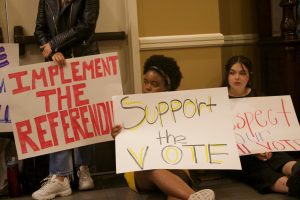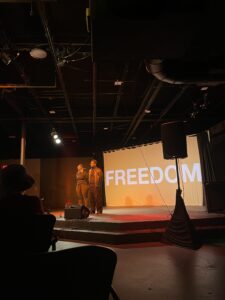What does it mean to receive an education from Georgetown, not despite but given the school’s history? A new one-credit seminar titled Race, Power, and Justice at Georgetown tries to help students answer this question. A 50-student pilot program of the course concluded on the week of Feb. 20, and the Fall 2024 semester will be the first time the class is required for all new students as part of the new Pathways to Social Justice (PtoSJ) requirement.
The interdisciplinary course will introduce new students to issues of race and their correlation to power and identity on campus and beyond. Beginning with the university’s history of slavery, the class will explore Georgetown’s relationship to D.C. and the world with the goal of understanding what justice—one of Georgetown’s core principles—means in practice.
“The real intention of the course is to get students to understand and begin to grapple with some of the ongoing histories of inequality at Georgetown really focused on, of course, race, which is in the title, but even more broadly, thinking about what inequality and social justice looks like and how it’s played out on Georgetown’s campus,” SFS professor Arjun Shankar, who helped design the new PtoSJ requirement, said.
In addition to the freshman seminar, offered twice every semester, students will have to take two three-credit courses that meet at least three of the five PtoSJ priorities: inclusive scholarship; intersectional approaches to identity; historical legacies of inequality and their contemporary impacts; national, regional, and global comparisons; and imagining justice. PtoSJ replaces the former Engaging Diversity requirement.
Sociology professor Carla Shedd believes the seminar intentionally prepares students for the rest of their requirements.
“This facilitates the students getting a foundation, and then when they take other courses, it’s not like, ‘I just so happened to take a class that dealt with diversity,’” Shedd said.
Seven professors representing all four undergraduate schools taught in the pilot program, structured around a weekly speaker event followed by smaller discussion groups. Guest speakers ranged from Mélisande Short-Colomb (COL ’21), a GU272+ descendant, people involved with Georgetown’s Prisons and Justice Initiative, campus ministry leaders, and more.
For Annie Kane (CAS ’24), the class has been an opportunity to reflect on her Georgetown journey.
“As a freshman, it would have made me think more intentionally about what kind of different clubs and organizations I would have wanted to join on campus that could be oriented towards this kind of work,” Kane said.
Chantal Li (SFS ’25) says she would take the course every semester if she could and found its emphasis on defining core racial concepts to be essential.
“It was very important, especially for the conceptualization of this class, to understand how to think about racism, racialization, ethnicity, so on and so forth, in order to have a better understanding of how we should approach the issues that we’re talking about more critically,” Li said.
Although Li thinks six weeks is not sufficient for the course, as every week’s subject could provide content for monthlong conversations, she’s excited for students to be introduced to these concepts early in their Georgetown journeys.
“I have a lot of freshmen in my discussion section, and they bring such interesting questions to the table. They’re so curious to learn more about it, and it just makes me really happy and hopeful for the future direction of how Georgetown is thinking about the education that it’s bringing to its students,” Li said.
The pilot program will inform the course’s future through student feedback. While student reviews have been positive, faculty acknowledge that this cohort was self-selecting.
“I think next year, there will be students who are there only because it’s required, who may have suspicions of what the purpose of the class is,” professor John Kraemer, who taught in the course, said. “I hope that this is a place where we can have those conversations in the open, because I think that they will bring something important to the dialogue.”
Scaling the course to the entire first-year class next semester—a 350-student jump—is a challenge on its own.
“Part of the problem is just space. We can barely squeeze everybody who’s supposed to take the class into a room as it is,” professor Adam Rothman, the class’s coordinator, said.
The challenge only grows if the course, like the pilot, is taught synchronously with the Doha campus.
“Qatar is actually on a different academic calendar than we are,” Rothman said. “I think if we can make it work, it’s gonna make this class just a great opportunity for very diverse students to come together in a way that doesn’t usually happen.”
Making the course relevant beyond the main campus has required faculty to innovate and approach the course with a broader lens.
“When we’re talking in the class about reparations, we don’t want to just talk about reparations in an American context. We want to talk about reparations in a global context,” said professor Jeremy Koons, who teaches in Doha.
One of Koons’s students, Jemimah Golo (GU-Q ’26), feels as though the class helped shape her perspective on race, even as someone who didn’t grow up in the U.S.
“Nigeria is predominantly Black … so I didn’t grow up knowing, ‘Oh, I’m Black.’ I grew up knowing I’m Jemimah. So even the class is helping me learn my identities and learn ways in which my identity shapes the world,” Golo said.
She hopes that the class will spark conversations within the school. “I think to Georgetown Qatar specifically, there’s a level of discretion when it comes to things race-related because we’re all diverse,” she said. “I think it will force Georgetown Qatar to become not just more aware, but have those uncomfortable conversations inside and out of class.”
For Shankar, the implications of this course, alongside PtoSJ, go beyond the classroom.
“It’s going to become a core for why students are going to want to come to Georgetown. To be at a school that actually takes seriously questions of race and social justice the moment you walk through the door, it’s going to set it apart from most universities in the United States, and that’s a big deal.”





